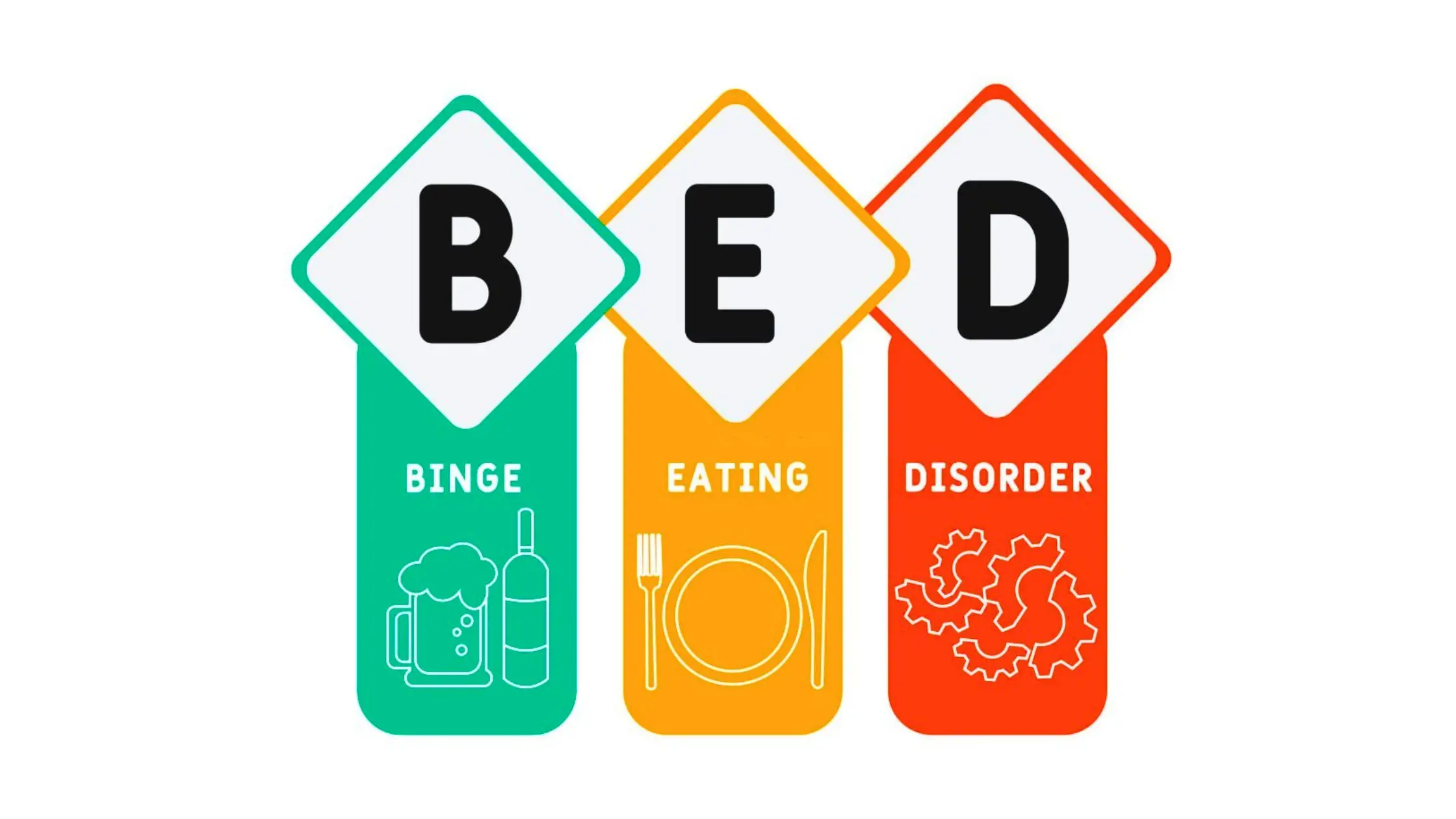Binge Eating Disorder: Symptoms, Causes, Risks, Treatment, & More!

Eating disorders are getting enough recognition lately as many celebrities have opened up about their harrowing experiences. More than a disorder or character flaw, these are serious medical conditions with underlying psychological factors.
One of the recently discussed eating disorders, binge eating disorder is considered to be the most common among them. Around 2.8 million people in the United States are said to be affected by binge eating disorders.
Dive into the article to find out more details about binge eating disorder, its symptoms, causes, and risk factors.
What Is Binge Eating Disorder?
Binge eating disorder or BED is an eating disorder where you tend to indulge in binge eating even if you are not hungry. This condition is similar to another kind of eating disorder, known as bulimia nervosa.

In bulimia nervosa, patients tend to eat a larger amount of food in a short time and purge these extra calories by fasting and rigorous exercises. But in binge eating disorder, the patient only indulges in eating larger amounts of food and there is no fasting or any other means of purging that follows.
Binge eating disorder has been only diagnosed as a medical condition recently. The common factors that trigger these conditions are often emotional stress and underlying psychological issues.
Symptoms Of Binge Eating Disorder
Even though experts consider binge eating as a core symptom of binge eating disorder, that is not the case every time. This means everyone with binge-eating tendencies need not be affected by binge eating disorder.

Rather, there are some other symptoms of binge eating disorder which are listed below:
Eating more food in a shorter amount of time:
When someone tends to eat faster than normal and consume more food in a short period, this might be the symptom of a binge eating disorder.
Not stopping eating even though one is full:
If a person tends to eat even after they are full and reach a state of being uncomfortably full, it can be considered a symptom of a binge eating disorder.
Making time for binge eating:
This might be one of the hidden symptoms of a binge eating disorder. People who have this condition tend to plan and allocate specific time for binge eating.
Eating a lot of food even though one is not hungry:
One of the major symptoms of binge eating disorder is a tendency to eat food even though you are not hungry.
Not being able to control the amount or nature of the food being eaten:
Another symptom of binge eating disorder is the inability to control what you eat or how much of that you eat.
Eating food in a secretive nature:
One of the popular images associated with binge eating is eating alone or in a secretive nature. This usually happens after midnight when someone has certain cravings for certain kinds of food.
Unable to remember the details of the food after bingeing:
Binge eating disorder is characterised by the patient’s inability to properly remember what they have just eaten.
Consistent feelings of shame, guilt, & disgust towards oneself:
This is one of the crucial symptoms of binge eating disorder. Patients affected with this condition tend to have feelings of shame and guilt after they have binge eaten.
Issues with body image:
Most of the people affected with binge eating disorder will have body image issues that are rooted in their psyche. This is also known as body image disturbance (BID) which is portrayed as an altered perception of one’s own body.
Causes Of Binge Eating Disorder
The exact reasons behind binge eating disorders haven’t been found yet. Still, some factors can increase the risk of binge eating disorders. These factors are listed below:
✅ Genetics: One of the key factors that increase the risk of getting binge eating disorders can be genetics. Research published in the Current Psychiatry Reports journal in 2015 found that genetics might play a crucial role in imparting binge eating disorder in an individual. It has been identified that people who have binge eating disorders tend to have an increased sensitivity to dopamine, which can be taken as evidence of its genetic roots.
✅ Emotional trauma: It has been found that emotional trauma can also cause binge eating. A variety of emotional trauma can lead a person to binge eat. It can be childhood trauma, bullying, abuse, the death of a close relative, or an accident.
✅ Psychological conditions: Eating disorders such as binge eating are rooted in our psyche and have much to do with certain psychological conditions. Studies have shown that almost 80% of people affected by binge eating disorder tend to have other psychological conditions such as PTSD, bipolar disorder, substance abuse, depression, etc.
✅ Body image and size: Binge eating disorder can be caused as an aftereffect of negative body image issues. Body size can also be a major reason as studies show that almost 50% of people affected with binge eating disorder have obesity.
✅ Gender: Research shows that binge eating disorder is more common among women than men. Certain biological factors might be the underlying reason behind this.
✅ Brain changes: Certain changes in the brain structure can also become a reason for binge eating disorder. As these can lead to a loss of control regarding eating and a heightened response to the pleasure derived from it.
Health risks associated with Binge eating disorder⚠️
There are certain health risks and complications associated with binge eating disorder. Some of the risk factors include
- Lower quality of life
- An inability to properly function at work and in personal life
- Isolation from community and society
- An increased risk of getting affected by obesity and overweight conditions
- The onset of other medical conditions such as heart disease, type 2 diabetes, sleep apnea, joint problems, etc
- A chance of psychological issues such as bipolar disorder, depression, anxiety, etc.
What Are The Treatment Options?
Binge eating disorders can be treated based on the causes and the seriousness of the issue. There are a variety of treatment options available which focus on eating behaviours, body image, psychological issues, etc. Some of the existing treatment options for binge eating disorder include:
👉Cognitive behavioural therapy: Also known as CBT, this is a psychotherapy method to analyze the connection between underlying psychological conditions and eating behaviour.
👉Interpersonal psychotherapy: This type of therapy usually employs individual or group-based therapy sessions.
👉Dialectical behaviour therapy: Through this therapy treatment, the patients of binge eating disorder are trained to regulate the underlying emotions that lead to such a condition.
👉Weight loss therapy: As the name suggests, weight loss therapy tends to help you reduce weight by improving the symptoms of a binge eating disorder.
👉Medications: Certain drugs such as antidepressants and antiepileptic drugs are administered in treating severe cases of binge eating disorder.
Ways To Overcome Binge Eating
Apart from medical treatment, by making some conscious changes in your lifestyle and eating habits, you can reduce the impact of binge eating disorders.

Some of the helpful strategies to overcome binge eating disorder are listed below:
- Keep a food journal: Keeping a regular record of the food you eat in a day can help you understand the severity of your binge eating habits.
- Seek support from friends and family: Having someone to talk to about those negative thoughts and emotions can help to relieve binge eating symptoms.
- Try mindfulness: Practising mindfulness can make you aware of the underlying emotions that lead to unhealthy eating habits.
- Change into a healthy diet: Avoid processed foods and eat healthy foods.
- Get into the habit of exercising: Exercise can help you produce endorphins, a hormone that can uplift your mood.
- Increase your sleep quality: Sleep is important for your bodily functions. Getting enough sleep can relieve you from unwanted feelings and emotions that lead to bingeing.
Recommended: How to Stop Overeating At Night? -You Should Know These 10 Tips
Final Thoughts
Going through the article, you can find that binge eating disorder is a condition that has underlying psychological implications. This is a recently diagnosed medical condition that needs more research and consideration.
Many factors can lead to binge eating disorders such as genetics, gender, psychological disorders, body image, etc. The symptoms of binge eating disorder include binge eating, eating a large share of food in a short period, eating without mindfulness, eating even if you are full, etc.
With proper medical treatment and lifestyle changes, you can find relief from binge eating disorders.





